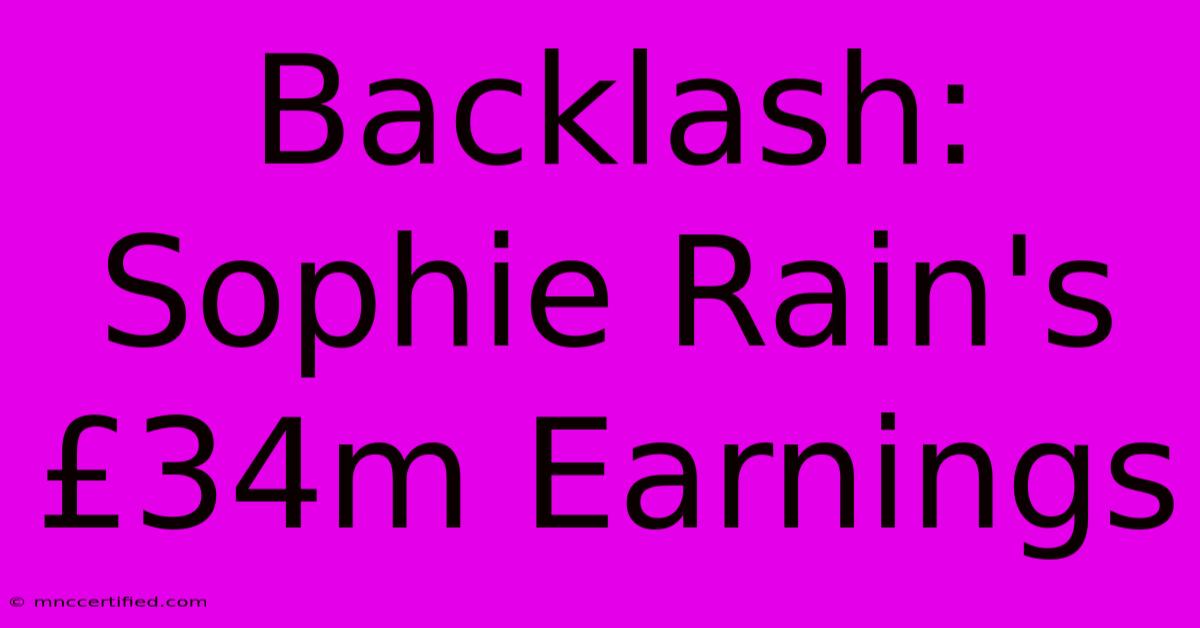Backlash: Sophie Rain's £34m Earnings

Table of Contents
Backlash: Sophie Rain's £34m Earnings Spark Debate
Sophie Rain, the social media influencer known for her lavish lifestyle and aspirational content, recently revealed her staggering £34 million annual earnings. This revelation has ignited a significant backlash, sparking a wider conversation about influencer culture, wealth inequality, and the ethics of online marketing. This article delves into the controversy surrounding Sophie Rain's income, exploring the criticisms leveled against her and the broader implications for the influencer industry.
The £34 Million Question: Where's the Money Coming From?
Sophie Rain's immense wealth stems from a diversified portfolio of brand partnerships, sponsored content, and her own merchandise line. While the exact breakdown of her income remains undisclosed, her social media presence reveals a consistent stream of collaborations with luxury brands, ranging from high-end fashion houses to exotic travel agencies. This level of lucrative partnership is, for many, the core of the controversy.
Critics Question Transparency and Authenticity
One major criticism leveled against Rain and other high-earning influencers is the perceived lack of transparency. Many accuse influencers of not disclosing the full extent of their financial arrangements with brands, potentially misleading their followers about product endorsements. The question of authenticity is also paramount. Critics argue that the curated, often unrealistic, portrayals of wealth on platforms like Instagram foster unattainable standards and contribute to societal anxieties about financial status. This perceived inauthenticity, coupled with the lack of transparency, fuels the negative sentiment surrounding her income.
The Backlash: Public Perception and Social Media Outrage
The revelation of Rain's earnings has triggered a wave of criticism across various social media platforms. Many users express frustration at the stark contrast between Rain's opulent lifestyle and the financial struggles faced by many of her followers. Hashtags like #SophieRainEarnings and #InfluencerWealth have become focal points for this discontent, with users sharing their thoughts and experiences.
Beyond the Numbers: The Broader Implications
The backlash against Sophie Rain is not merely a personal attack; it reflects broader concerns about the influencer economy's ethical and social implications. These concerns include:
- Wealth Inequality: The sheer disparity between Rain's income and the average income of her followers highlights the growing chasm of wealth inequality.
- Unrealistic Expectations: The idealized portrayals of wealth and success on social media contribute to unrealistic expectations and potentially negative mental health impacts for viewers.
- Ethical Marketing Practices: Concerns persist about the transparency and ethical standards within influencer marketing, particularly regarding undisclosed sponsorships and manipulative advertising techniques.
Navigating the Future of Influencer Marketing
The controversy surrounding Sophie Rain's earnings underscores the need for greater transparency, accountability, and ethical considerations within the influencer marketing industry. Regulators and platforms alike must consider stricter guidelines regarding disclosure and advertising practices. Influencers themselves should prioritize authenticity and responsible content creation, fostering a more genuine connection with their audience.
A Call for Change: Toward a More Ethical Influencer Landscape
The future of influencer marketing hinges on a shift toward greater responsibility and ethical conduct. This means:
- Mandatory Disclosure: Clear and consistent disclosure of all sponsored content and financial arrangements.
- Focus on Authenticity: Prioritizing genuine connections with followers over superficial displays of wealth and success.
- Promoting Financial Literacy: Influencers using their platforms to promote financial awareness and responsible spending habits.
Sophie Rain's £34 million earnings represent more than just a personal success story; it is a stark reflection of the evolving landscape of influencer marketing and the societal anxieties it generates. Addressing the ethical concerns raised by this controversy is crucial for the future of the industry and the well-being of its audience.

Thank you for visiting our website wich cover about Backlash: Sophie Rain's £34m Earnings. We hope the information provided has been useful to you. Feel free to contact us if you have any questions or need further assistance. See you next time and dont miss to bookmark.
Featured Posts
-
Estrategia James Bond Ruleta
Nov 30, 2024
-
Cannon On Narcissistic Personality Disorder
Nov 30, 2024
-
Sunderland Fall To Sheffield United 1 0
Nov 30, 2024
-
Egg Bowl Controversy Late Hit Debate
Nov 30, 2024
-
Apple Watch Black Friday Top Deals Live
Nov 30, 2024